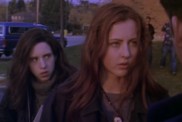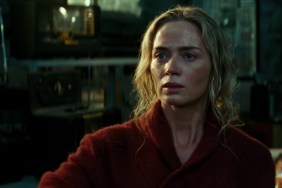Cast:
John Magaro as Douglas
Bella Heathcote as Grace Deitz
Will Brill as Wells
Jack Huston as Eugene
James Gandolfini as Pat
Molly Price as Antoinette
Meg Guzulescu as Evelyn
Dominique McElliogott as Joy Deitz
Christopher McDonald as Jack Deitz
Isiah Whitlock Jr. as Landers
Justine Lupe as Candace
Lisa Lampanelli as Aunt Josie
Robert Funaro as Uncle Murph
John Tormey as Uncle Paul
Charlie Plummer as Kenneth Dietz
Brad Garrett as Jerry
Directed by David Chase
Story:
In 1960s New Jersey, the influence of the Rolling Stones and the British Invasion leads Doug (John Magaro) and his friends Eugene (Jack Huston) and Wells (Will Brill) to form a band, but as Doug gets into a relationship with the rich popular girl named Grace (Bella Heathcote), she gives him the confidence to get in front of the band as singer, causing friction within the group.
Analysis:
Anyone who wondered how David Chase might follow up the highly-debated finale of his HBO show “The Sopranos” may not be surprised his feature film directorial debut would also involve Italian-Americans living in New Jersey. This one has absolutely nothing to do with crime or mobsters, instead taking a look at the ’60s through a group of young friends trying to form a band.
It mostly centers around John Magaro’s Doug, a recent high school graduate who forms a cover band with his friends Eugene (Jack Huston) and Wells (Will Brill) after seeing the Rolling Stones on television. Doug spent most of his high school years lusting after the wealthy Grace, played by Bella Heathcote, but she only starts paying Doug any heed when he comes out from behind his drum kit to sing a song when Eugene falls ill. This incident will eventually lead to friction between the two friends as the band starts getting around and becoming more successful.
“Not Fade Away” isn’t so much of a coming of age movie as it is a look at a time when the country was changing following the assassination of Kennedy and at the height of the Civil Rights movement and sexual revolution, as seen through Doug’s eyes.
The realities of playing in a band and how some bands make it while others languish in New Jersey without ever being recognized is tough material to handle well, especially following in the footsteps of a classic like Cameron Crowe’s “Almost Famous,” but Chase gives it an equally personal touch making everything feel real. As might be expected when you have Bruce Springsteen’s right-hand man “Little Steven” Van Zandt as your executive producer and musical director, the music is great including the couple of songs he wrote specifically for the fledgling band. Chase also helps set the tone by intercutting Doug and Grace’s story with black and white footage from television, most notably performances by the Stones and other groups.
Now, if you were to tell me that the mopey kid from Josh Radnor’s “Liberal Arts” was going to play the lead in a movie, let alone playing a believable rock singer, I’d think you were absolutely nuts, but John Magaro does a surprisingly solid job carrying a role that offers lots of challenges. Some of the actors playing Doug’s bandmates aren’t as good with Jack Huston seeming way too old for the role he’s playing.
As someone who has played in many bands, covering rock tunes at parties, I probably could relate to some of the situations more than most, even if I’m not quite old enough to appreciate the ?60s. Chase finds a way of being nostalgic without being overly sentimental, although it’s not just about the band and their music. Once Grace and Doug are together, it’s just as much about their relationship and her family life, which is fine since Heathcote has a great on-screen presence as does Dominique McElliogott as her older hippie sister. As much as the slice of life piece eventually starts veering towards the dramatic, there are many funny moments, particularly Doug’s family life with James Gandolfini as his disapproving father and Molly Pryce as his always complaining mother. Of all the things in the movies, these interactions are something the movie could have used more of since they are the most entertaining bits.
What almost kills any good will Chase has established is the absolutely ridiculous ending that tries to tie things up without resolving anything–this may sound all too familiar to fans of Chase’s “Sopranos” fans–although it does explain why Doug’s younger sister has been sporadically narrating the movie from the beginning, which isn’t clear up until that point.
Despite that awkward and unsatisfying ending, Chase proves himself to be as capable a film director as he is at creating riveting television and “Not Fade Away” is an excellent transition into film even if it’s likely to have a far more limited audience than “The Sopranos” – probably older people who dig British Invasion music.










